- Home
- Donald Hamilton
The Infiltrators Page 2
The Infiltrators Read online
Page 2
“Apparently there were other considerations. Her accomplices had got away, and it was claimed that they or the people they worked for had considerable resources. The Office of Federal Security, which handled the case, persuaded the judge that there was considerable danger that they would organize an attempt to free her, or to silence her, not altogether impossible at Alderson. Hence Ames.” He paused, and glanced at some paper on his desk, and looked up again. “As a matter of fact we have reason to believe that somebody still wants to silence her, now that she’s free—well, will shortly be free.”
I sighed. “I see. It’s a bodyguard job, then.”
“In part, yes. We most certainly want her kept alive. But also we want to know why somebody wants her dead, and we want to know the identity of that somebody. We also want to know everything she knows, and hasn’t told, about the disappearance of her husband—Dr. Ellershaw, you’ll remember, was a brilliant young physicist employed at the Center for Advanced Defense Research at Los Alamos.”
I said, “She wasn’t married when I met her, so all I know about the husband is what I read in the papers at the time of her trial. And the facility to which you’re referring is a more or less independent installation, up a side canyon,” I said. “Conejo Canyon. Rabbit Canyon, if you want the translation.”
“The information doesn’t seem particularly significant, Eric, but thank you,” he said, using my code name to emphasize that this was business, and irrelevant linguistic digressions were inappropriate. “But that’s one of the reasons you were selected for this assignment. You’re familiar with the Santa Fe-Los Alamos area, having lived there. And you’re at least slightly acquainted with the female subject.”
I said thoughtfully, “After the time that has passed since Dr. Ellershaw disappeared and his wife was arrested, you’d think any scientific information involved would be pretty damn obsolete. Why this belated interest in an eight-year-old espionage case?”
“Nine-year-old, to be exact. The young woman didn’t go to prison until a year after her husband’s activities were uncovered, what with the trial and the appeals.” He shook his head. “And why she’s still of interest is precisely what we have to find out. Who’s afraid of Mrs. Ellershaw at this late date, afraid enough to still want her silenced? And why are they afraid?”
I frowned. “How about the possibility that she may be innocent, sir? That she may have been framed, and that the people who framed her are scared that, having had eight long years to work on it in her cell, she may. have figured out how it was done to her and who did it?”
He glanced at me sharply. “You keep sounding as if you had some doubts about her guilt, Eric.”
I said, “One year from arrest to prison! Considering the present state of our judicial system, that’s some kind of a record, isn’t it, sir? My God, I know of considerably less important cases that have been in the courts for five years and more. Doesn’t it look as if somebody with a lot of influence worked damned hard to get this girl tucked away behind bars in a great big hurry?”
Mac shrugged. “Maybe. And maybe her guilt was self-evident and her lawyer incompetent so it took less time than usual.”
“I believe she had the top brains of her law firm defending her,” I said. “Anyway, the whole thing’s out of character. Her character. I only saw her that one day, but she had everything going for her. Why would she risk it all like that? She was an ambitious kid eager to get ahead in her profession and not particularly idealistic—hell, when I met her, she was helping to defend a fairly unpleasant murderer even though she knew damn well he’d done the killing. I can’t see anybody selling her the glorious revolution of the proletariat. And she had doting parents wealthy enough to finance a top education for her and, probably, help her out generously if she needed it afterwards. Anyway, she was making a pretty good salary with promises of great things to come. So it seems unlikely she’d do it for money.” I grimaced. “I know, sir, it’s exactly that kind of privileged kids who wind up robbing banks and blowing up things for the Weather Underground or whatever the currently fashionable protest organization may be. But I wouldn’t have expected it of this kid.”
“Hardly a kid now, after eight years in Fort Ames,” Mac said dryly. “If she was convicted wrongly, it’s unfortunate, but I want you to bear in mind that her innocence, or guilt, is of interest only to her, except as it affects whatever problems we face out there in New Mexico. Curb your chivalrous impulses, please. We are not in the business of righting wrongs or correcting injustices. What we are interested in is finding out just what is going on in that Rabbit Canyon of yours. What has been going on there for nine years, or perhaps even longer, that Dr. Roy Ellershaw was mixed up in guiltily or stumbled upon innocently? Who considered him enough of a threat that he helped the young man to disappear voluntarily or caused him to disappear involuntarily? Who arranged for the young wife to be arrested and sent to the penitentiary, justly or unjustly, to get her out of the way also? Who, now that she’s being set free, feels threatened enough by her continued existence to arrange for her murder?” Max shook his head. “At least that’s one series of possibilities; there are others. I think the lady is the key. Well, her husband is the real key, I suspect, and if you can persuade her to lead you to him—assuming that she can—so much the better. Otherwise you’ll have to use Mrs. Ellershaw herself; and in order to employ her usefully you must of course prevent her from getting killed. You can have Jackson to assist you. The two of you worked pretty well together on that recent Chicago operation, didn’t you?”
“Jackson’s fine,” I said. “But he’ll need help if he’s going to cover us with any efficiency.”
“He’ll have help, all he requires,” Mac said.
I looked at him for a moment. Unlike that glamorous outfit that operates out of Virginia, we don’t have unlimited manpower at our disposal; but he seemed to be giving Jackson and me pretty much a free hand with such reserves as we did have.
“So it’s a big deal,” I said.
“It could be very big. But we don’t need to know exactly why. Or so we have been informed.”
“I see.” I made a wry face. “Just give it everything we’ve got and don’t ask questions. The fate of the nation rests upon the shoulders of one lousy lady ex-con. Well, soon-to-be ex-con, and I’ll bet it can’t be soon enough for her.”
* * *
Hardly a kid now, after eight years in Fort Ames. Mac’s rather callous remark returned to me as I guided the little sports car out of the parking lot, with the drab penitentiary graduate I’d once known as a very smart and attractive young professional woman sitting silent beside me, holding her imitation-leather purse on her lap.
It was time for somebody to say something, and I said, “I had a big four-wheel-drive unit for a good many years. Used it for camping and hunting whenever I got the chance; but it started to wear out at last and at eight miles to the gallon I couldn’t afford to feed it any longer, anyway. Brace yourself, you’ll find current gas prices a real shock. So I thought I’d try something different for a change. It’s the rotary Wankel engine, which seems to be a smooth and reliable piece of machinery; and it handles very well. Of course it’s really too damn comfortable for a true sports car. A real sports car is supposed to sound like a boiler factory and ride like a rock and drip water down your neck when it rains.”
She gave no indication of hearing any of this nonsense. She just sat in the bucket seat beside me, unmoving, until at last she turned her head to look behind. I knew what she was watching: the prison was just disappearing from sight back there. When it was gone she settled herself looking forward once more.
“Did you ever catch up with that man?” she asked abruptly.
“What man?”
“The one you were after. When you came to see me that time and I arranged for you to talk with our client, Willy Chavez.” She hesitated, and said with a hint of reminiscent pride, “We got him off, you know.”
“I didn’t know,” I
said. “But I thought you would, all that high-powered legal talent.”
She said, rather grimly, “I had exactly the same kind of high-powered talent, Mr. Helm, and you can see how much good it did me. It’s not always a matter of who can bring the biggest legal guns to bear. But you haven’t answered my question.”
I said, “I caught up with him, in a manner of speaking. I got to look at him in the morgue after somebody else had shot him.”
“Was that a satisfactory ending to your mission?”
I shook my head. “Not really. The man’s name, the inoffensive name he was going under, was Horace Bixby. He had others. He got off a shot before he was killed. I was too far behind in spite of what I’d learned from your client, Chavez; a day behind. If Bixby hadn’t thrown his first shot a bit, hurrying, or if his victim’s bodyguard had been slow and let him fire again, my mission would have been a total failure. As it was, I could kid myself that Bixby rushed into the job under unfavorable conditions because he sensed I was closing in on him. However, an important man took a nasty little wound and spent unnecessary time in the hospital, something I was supposed to see didn’t happen, since we knew what was planned even if we didn’t know whom it was planned for.” I turned my head to look at her. “It was exactly the opposite situation to the one you’re in, Mrs. Ellershaw.”
She frowned. “I don’t understand. What…?”
“I told you, we’re trying to avoid having you get killed, remember? In your case we’ve learned the person it’s going to be done to, but we don’t yet know who’s been sent to do it.”
She focused the expressionless gray eyes on me. “Don’t con me, man! Why the fuck are you trying to scare me? I mean, it just don’t make no sense!” She heard herself employing the ugly speech with which she’d lived for the past eight years and winced. “I mean, why in the world would anybody want to kill me now, Mr. Helm, after all the time I’ve been locked up in… in that p-place?”
I said, “Presumably because you could do no harm in there, but you’re out of there now.”
“Are you certain it’s me they’re after? How can you be sure? How can you even know that such a thing is being planned?”
“Look, Mrs. E„” I said, “we deal with all kinds of people, mostly nasty people. In fact it’s been said that we’re pretty nasty ourselves. But there’s a certain amount of give and take. Occasionally somebody gives somebody a break and it’s kind of expected that eventually, if the opportunity arises, something will be done in return. In this case, a certain agent let somebody go free maybe he shouldn’t have—apparently the basic assignment was finished and he was avoiding unnecessary complications—and the guy who was let go was grateful enough to get in touch about a week ago with what he considered a good tip.”
“What tip?”
I watched the road ahead as I drove, reproducing the words from memory. “It went something like this, a voice on the phone saying: Somebody calling himself by a name you’ve been asking about is shopping for talent to hit the dame in the Ellershaw case when she gets out of that federal slammer, and don’t expect any more favors, see, this squares us.”
After a little, Madeleine Ellershaw shivered abruptly. “What did he mean by a name you’d been asking about?”
“Did you ever hear of anybody named Tolliver?”
I hoped I made the question sound casual enough. The security freaks who’d saddled us with this assignment had thought the name important enough to give us. We might kind of listen for it if we had nothing better to do, they’d said; and if we heard it we should report the circumstances immediately with all relevant details. No, we didn’t need to know why.
“Tolliver?” My passenger’s voice indicated no recognition. “No, it’s sometimes spelled Taliaferro, isn’t it?”
I said, “We don’t know the spelling; we’ve only heard it over the phone.”
“I’m sorry. I know it as a name, of course, but I can’t think of anybody… Is it important?”
I shrugged, and dismissed the subject, a little pompously: “Who knows what is or isn’t important these days, Mrs. Ellershaw?”
She turned her head to study me for a moment, and asked, “To what do I really owe your presence, Mr. Helm?”
I liked the elaborately formal question, which she would have phrased quite differently back in the grim building we’d just left. The woman was digging inside herself for grammar and vocabulary that had been unused for years and trying it out on me; it was a hopeful sign.
“I told you—”
“Yes, you’re supposed to protect me.” She glanced at me sharply. “But why you? Why were you selected to be nice to the convicted spy and disbarred female attorney when she stumbled out of the joint in her cheap new clothes?” Her voice was flat and expressionless. “Just because we’d met once in the past and you’d bought me a dinner?”
“That was part of it,” I said. “Also, I know a bit about Santa Fe, where you live.”
“Live!” she murmured. “Where do I really live now, Mr. Helm? Last permanent residence, Fort Ames, Missouri! I had to sell the house and both the cars and my jewelry… Roy and I lived very nicely, but we didn’t have all that much, really. Two young people with good incomes, we’d assumed a lot of debt for the kind of life we wanted together. We could have handled it easily if everything had gone as we expected, but it didn’t go that way. When Roy disappeared and I was indicted it was like a pretty soap bubble, pop! I fought to keep the house, it seemed important to maintain appearances and stay living as I had, but it was more important to keep my freedom—going to jail seemed inconceivably degrading then.” She drew a long ragged breath. “That meant money for the bail. And the legal costs, even though the firm—Mr. Baron—was very generous about conducting my defense. But in the end it all went, the creditors got their share, and my court expenses took care of what was left. I wound up borrowing, too much, from my parents.”
She was silent for a little, watching the blacktop road rushing towards her. I didn’t speak. She drew another long breath and went on.
“They’re dead now, both of them,” she said. “My parents. I was their only child. They’d been very proud of me, of my… my professional success. My happy marriage. This killed them.” After a little, she said, “But I suppose I have to go back there first even though I don’t really want to. I’ll be bound to meet people I know—knew—and I don’t expect to enjoy their reactions when they see what’s become of the clever, clever girl who was going to set the world on fire. I was a bit self-satisfied in those days, I’m afraid. So it’s not something I’m looking forward to, but Dad’s lawyer, old Mr. Birnbaum—I call him Uncle Joe—wrote that he wanted to see me as soon as I got out. Some things still to be done about the estate. There wasn’t much left for me, I understand, just a few thousand, perhaps as much as ten or fifteen, but I guess that won’t go very far these inflated days judging by the little TV I got to watch in there. They gave me everything they could spare while… while it was going on. But it’s better than nothing; it’ll keep me for a little, while I’m figuring out some way of earning a living as… as a rehabilitated criminal who’s paid her debt to society. But God only knows what way.”
I said, “The record shows that while your prison behavior was exemplary in most other respects, you took no advantage of any of the educational or vocational—”
“Educational!” Her voice was suddenly fierce. “After… after all the academic honors, real honors, I’d earned, was I supposed to let a bunch of semi-illiterate stumblebums give me a degree in finger painting? Call it being stuck-up, they did, but I couldn’t bring myself to that. And as for vocational, can’t you see that I couldn’t do that? After all the years and all the effort and all the money that had been spent to make me an educated person and a good lawyer, a real professional woman, how could I? Standing in that ghastly shop learning how to set women’s hair! Or even learning how to work a simple computer like a good little office girl! That would have been admitting that
… that there was no hope for me at all. That there was no real life left for me, the kind of life I’d been brought up to and educated for. Nothing but a gray tawdry hand-to-mouth existence stretching endlessly off into the dismal future… Of course I was kidding myself. That is all that’s left now, isn’t there?”
She was a contradictory mixture of elitist arrogance and hopeless despair. But I was glad to see the arrogance; I’d been afraid that all pride had been knocked out of her. I changed the subject deliberately.
“Did your husband have any distinguishing marks or scars in intimate places, Mrs. Ellershaw?”
She frowned at the sudden switch. “Why do you ask?”
“He disappeared and left you holding the bag, didn’t he? And now somebody wants you dead. Maybe Dr. Ellershaw has surfaced somewhere else with a new identity and a new appearance—plastic surgery, contact lenses, dyed hair—only there’s something he can’t change, something only a wife would know about. And he’s still a wanted man. Maybe he’s afraid that now you’re out you’ll come looking for him, one of the few people in the world who really know what to look for. Did he have any sexual peculiarities that might identify him?”
She shook her head. “I don’t quite know what you mean by that. Physically, well, his penis was perfectly normal, judging by my rather limited experience with penises, if that’s what interests you. Circumcised, if it matters, although he wasn’t Jewish. He had two testicles like half the human race. He liked the mouthy stuff sometimes. A blow job really turned him on.” Her voice kept switching disconcertingly between university refinement and prison vulgarity. “At the time we were married I thought it was… well, quite disgusting. I was terribly shocked when he first suggested it. I was sexually rather innocent and fastidious back in those days. I just liked having my husband on top of me doing it the nice old-fashioned way. The missionary position, I believe it’s called. Warm and cozy. But I loved him very much and I forced myself to do it the way he wanted when I realized it meant a lot to him. I enjoyed being able to please him so much, even though I still found the act itself rather revolting.” She glanced at me coolly. “You see, they have me well trained, Mr. Helm. No matter what intimate and personal and prying questions you ask, Ellershaw will speak right up like a good little felon who’s forfeited all rights to privacy.” After a moment, when I didn’t react to this, she went on: “Several million other men like oral sex, so it doesn’t give you much to go on, does it? Anyway, it’s a bum scenario you’re writing there, man. You’re way off the beam. Roy is dead.”

 The Two-Shoot Gun
The Two-Shoot Gun Mad River
Mad River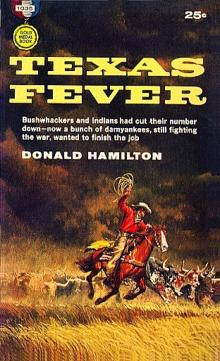 Texas Fever
Texas Fever Ambush at Blanco Canyon
Ambush at Blanco Canyon The Big Country
The Big Country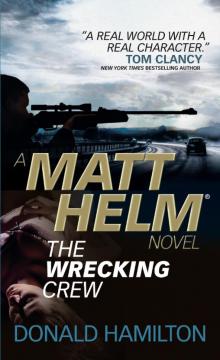 The Wrecking Crew
The Wrecking Crew The Devastators mh-9
The Devastators mh-9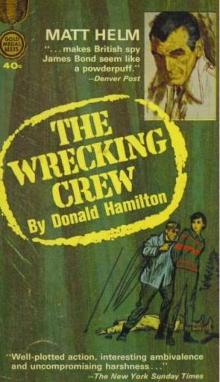 The Wrecking Crew mh-2
The Wrecking Crew mh-2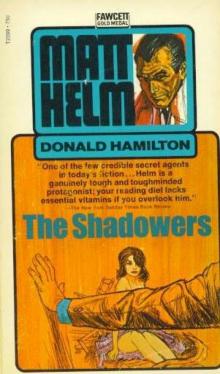 The Shadowers mh-7
The Shadowers mh-7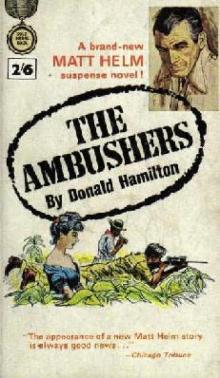 The Ambushers mh-6
The Ambushers mh-6 The Betrayers
The Betrayers The Terrorizers
The Terrorizers The Poisoners
The Poisoners The Devastators
The Devastators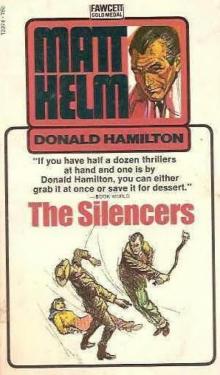 The Silencers mh-5
The Silencers mh-5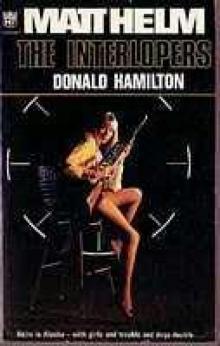 The Interlopers mh-12
The Interlopers mh-12 The Shadowers
The Shadowers The Annihilators
The Annihilators The Vanishers
The Vanishers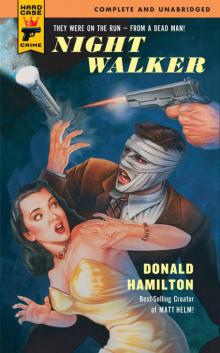 Night Walker
Night Walker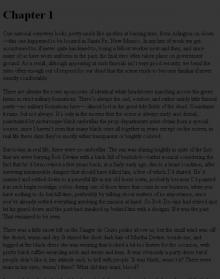 The Revengers
The Revengers The Frighteners
The Frighteners The Infiltrators
The Infiltrators The Intriguers mh-14
The Intriguers mh-14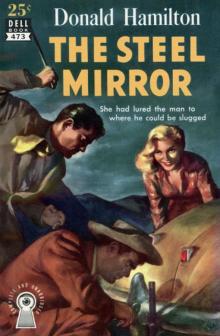 The Steel Mirror
The Steel Mirror The Menacers
The Menacers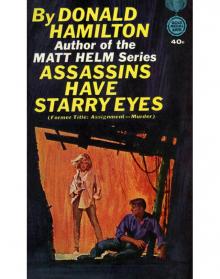 Assassins Have Starry Eyes
Assassins Have Starry Eyes Death of a Citizen
Death of a Citizen Matt Helm--The Interlopers
Matt Helm--The Interlopers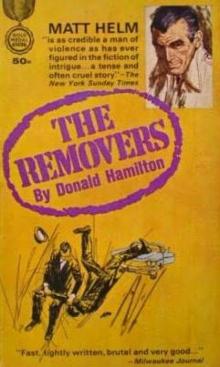 The Removers mh-3
The Removers mh-3 The Demolishers
The Demolishers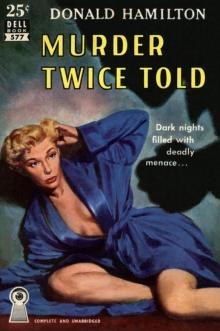 Murder Twice Told
Murder Twice Told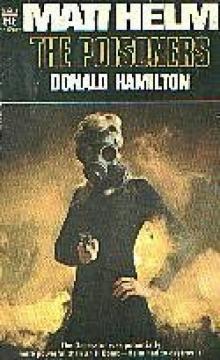 The Poisoners mh-13
The Poisoners mh-13 The Ambushers
The Ambushers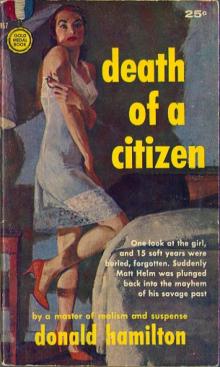 Death of a Citizen mh-1
Death of a Citizen mh-1 The Silencers
The Silencers The Removers
The Removers The Intimidators
The Intimidators The Damagers
The Damagers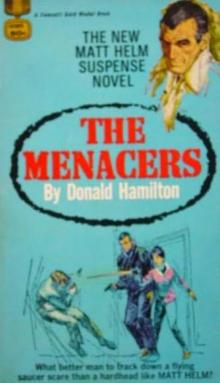 The Menacers mh-11
The Menacers mh-11 The Retaliators
The Retaliators Murderers' Row
Murderers' Row The Ravagers
The Ravagers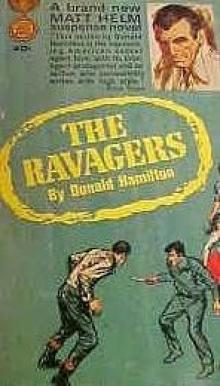 The Ravagers mh-8
The Ravagers mh-8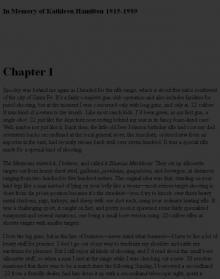 The Threateners
The Threateners The Betrayers mh-10
The Betrayers mh-10